This interdisciplinary workshop – November 5-7, proposal deadline March 15 – invites scholars to ask what it means to make a promise in a society characterized by legal and religious pluralism. In such conditions of multiplicity, how are public promises made meaningful through appeals to varied transcendent powers and diverse traditions of material culture and embodied emotion? Read more about the call here.
Event Videos
We are pleased to share videos of our recent conversations!
Museums, Religion, and the Work of Reconciliation and Remembrance on 9 May 2019, Jewish Museum Berlin. View video.
In their collections and their buildings, museums often carry traces of religion, past and present, which they curate and narrate for diverse audiences. Increasingly, museums are called on to represent and acknowledge the politics embedded in these collections, whether by repatriating spiritually-charged objects acquired through colonial networks or by telling more complex stories of national histories of racism, antisemitism, and violence.This public panel featured presentations by two museum curators who have long reflected on these issues: Jisgang Nika Collison (Haida Gwaii Museum, Haida Nation & Canada) and Léontine Meijer-van Mensch (State Ethnographic Collections of Saxony, Germany). Chair: Sharon Macdonald (CARMAH, Humboldt-University Berlin).
Schloss Conversations — Venus in Transit: Prehistoric Art and Religion on 28 January 2019. View video.
A conversation with Silvia Tomásková (University of North Carolina, Chapel Hill) and Nicolas Conard (University of Tübingen) hosted by Pamela Klassen (University of Toronto) and Monique Scheer (University of Tübingen). Tübingen houses some of the oldest works of art ever discovered; archeologists also hypothesize that they had religious functions. This installment of the ‘Schloss Conversations’ brings together perspectives from religious studies, cultural history, and archeology to think about the social and political contexts of the narratives that emerge around such artifacts and how they might be fueled by the apparatus provided by the UNESCO World Cultural Heritage site.
Schloss Conversations — Reformation and Refugees: Alternative Histories, 14 November 2017. View video.
A conversation with Nicholas Terpstra (University of Toronto) and Peter van der Veer (MPI Göttingen) hosted by Pamela Klassen (University of Toronto) and Monique Scheer (Ludwig-Uhland-Institut, University of Tübingen). Both the 500-year anniversary of the Protestant Reformation and the arrival of hundreds of thousands of refugees have sparked intense reflection upon religion and public memory in Germany this year. This first in a series of ‘Schloss Conversations’ will take up these issues from historical and anthropological perspectives.
Museums, Religion, and the Work of Reconciliation and Remembrance
Update: View video of this event online.
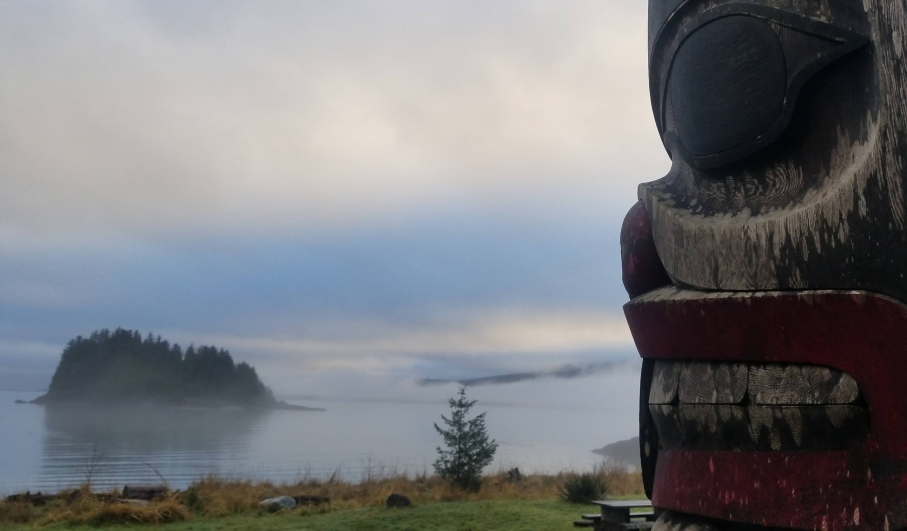
Ts’aahl totem pole by Garner Moody in Skidegate on the island Haida Gwaii, Canada, 2001; photo: Raven Ryland, Courtesy Haida Heritage Centre
Upcoming Event:
Museums, Religion, and the Work of Reconciliation and Remembrance
Thursday, 9 May 2019, 6.30 pm
W. M. Blumenthal Academy,
Klaus Mangold Auditorium
Fromet-und-Moses-Mendelssohn-Platz 1, 10969 Berlin
Visit the event page on the Jewish Museum Berlin site.
Workshop participants: visit the internal workshop page for the event (password-protected).
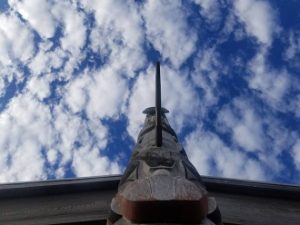
K’uunna totem pole by Jim Hart in Skidegate on the island Haida Gwaii, Canada, 2001; photo: Raven Ryland, Courtesy Haida Heritage Centre
Schloss Conversations: Venus in Transit
Update: View video of this event online.
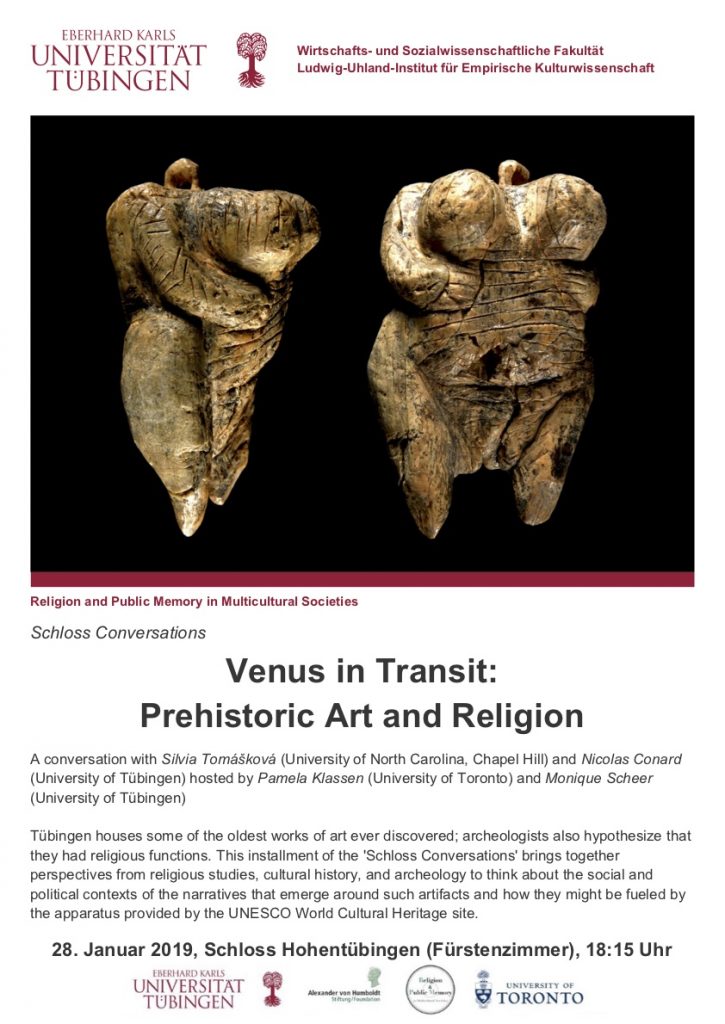
Venus in Transit: Prehistoric Art and Religion
Schloss Conversations
28 January 2019
A conversation with Silvia Tomášková (University of North Carolina, Chapel Hill) and Nicolas Conard (University of Tübingen) hosted by Pamela Klassen (University of Toronto) and Monique Scheer (University of Tübingen)
Tübingen houses some of the oldest works of art ever discovered; archaeologists also hypothesize that they had religious functions. This installment of the ‘Schloss Conversations’ brings together perspectives from religious studies, cultural history, and archaeology to think about the social and political contexts of the narratives that emerge around such artifacts and how they might be fueled by the apparatus provided by the UNESCO World Cultural Heritage site.
About the Project
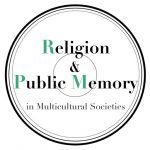 With the support of the Anneliese Maier Research Award from the Humboldt Foundation, Dr. Pamela Klassen of the University of Toronto and Prof. Dr. Monique Scheer, Director of the Ludwig-Uhland-Institut of Historical and Cultural Anthropology, University of Tübingen, are directing a research project on Religion and Public Memory in Multicultural Societies. The project runs from 2015 to 2020.
With the support of the Anneliese Maier Research Award from the Humboldt Foundation, Dr. Pamela Klassen of the University of Toronto and Prof. Dr. Monique Scheer, Director of the Ludwig-Uhland-Institut of Historical and Cultural Anthropology, University of Tübingen, are directing a research project on Religion and Public Memory in Multicultural Societies. The project runs from 2015 to 2020.
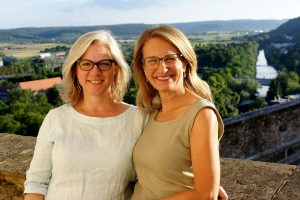
RPM focuses on how the contested—and sometimes celebrated—categories of religion and multiculturalism shape, provoke and complicate projects of public memory. How a nation remembers is a question that can be asked at both the large scale of nationally-run museums or Truth and Reconciliation Commissions and the small scale of lay people who write local histories or walk in local pilgrimages. This collaborative project gathers a diverse and international group of scholars and students doing both contemporary fieldwork and historical research. Our guiding question is: how does the past inform the present when living with religious diversity is an everyday reality for many, at the same time that religious difference is blamed for serious conflicts that strike at the heart of our societies?
Our first workshop, Christmas in the Multicultural City, focused on historical and anthropological approaches to Christmas as a politically and emotionally contested secular/religious holiday. Our second workshop, Sites of Memory: Religion, Multiculturalism, and the Demands of the Past, was held in September 2016 at the University of Toronto.
For a brief overview of the wider project, see here.